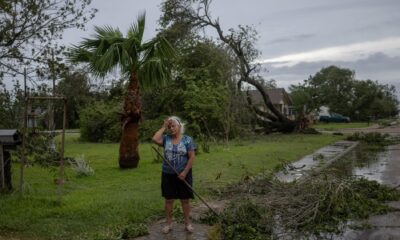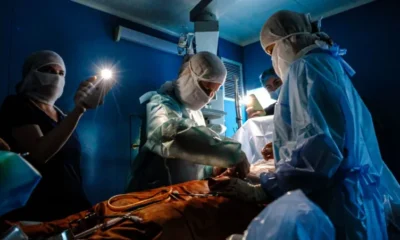A top U.S. health expert who was among the first to sound the alarm about the COVID-19 pandemic last year is now raising concerns about the spread of the P.1 variant in Canada, warning the country is acting too slowly.
Eric Feigl-Ding, an epidemiologist and adjunct senior fellow with the Federation of American Scientists, warned in January 2020 — two months before the World Health Organization declared a pandemic — that the novel coronavirus could become a “thermonuclear public health crisis.”
“It’s not good,” he said. “We’ve known for quite a while how bad this variant is. But there has been a reluctance to follow the science on this.”
For the past two weeks, his focus has been on Canadian provinces that are seeing outbreaks of P.1, a virus variant first identified in Brazil that is now spreading rapidly in British Columbia and growing roots in Alberta and Ontario.
Read more:
P.1 variant is spreading in Canada. What do we know about it and vaccines?
Emerging non-peer reviewed Brazilian research spearheaded by the Observatório COVID-19 BR suggests the P.1 variant is up to 2.5 times more transmissible than the original COVID-19 strain. Another study out of Manaus, the Amazonian city hit hard by the variant, suggests that out of every 100 COVID-19 survivors, anywhere from 25 to 60 could become reinfected if exposed to P.1.
The number of cases of the P.1 variant reported in B.C. alone has exploded over the past few weeks, hitting 737 as of Monday — nearly double the number reported before the start of the Easter long weekend.
Monday saw B.C. hit a new all-time record for intensive care patients impacted by COVID-19, with 96 people currently receiving critical care.
That record was predicted in late March by Sally Otto, a University of British Columbia mathematical biologist who has done COVID-19 modelling. She said the ICU surge would likely be fuelled by multiple variants, include P.1.
Feigl-Ding was also sounding the alarm about the situation in B.C. around the same time. On March 26, he pointed out on CNN that the province was seeing more daily cases of the P.1 variant — between 20 and 30 — than the entire United States combined.
Let this sink in—
The more contagious #P1 variant from Brazil has now invaded N America—British Columbia🇨🇦 has a sudden cluster of 215+ new #P1 cases sequenced by one Vancouver lab.#P1 is more contagious, has reinfection risk and possibly more severe.🧵pic.twitter.com/CKGI3umuk5
— Eric Feigl-Ding (@DrEricDing) March 27, 2021
Feigl-Ding also points to a BC Centre for Disease Control report from March 24 that identified 84 cases of P.1 that were not linked to returning travellers — strongly suggesting community spread.
“I can’t believe (B.C. public health officials) didn’t act then” and impose harsher restrictions, he told Global News. “And now here we have all this mess.”
Crisis in Brazil
The situation in B.C. still pales in comparison to the crisis the P.1 variant has sparked in Brazil.
The country is now seeing the worst wave of the pandemic yet, reporting an average of over 3,000 deaths per day.
The World Health Organization on Thursday said Brazilian hospitals were in critical condition, with many intensive care units over 90 per cent full. National media and public health institutions have called the situation a “collapse” of the health-care system.
3) I’m not exaggerating that hospitals in Brazil are in collapse. This is the headline of a major newspaper. pic.twitter.com/86lFKsFuAy
— Eric Feigl-Ding (@DrEricDing) March 21, 2021
Yet Feigl-Ding says the fate of Brazil — whose president Jair Bolsonaro refuses to support masks and lockdowns — can be avoided in Canada by expanding contact tracing and toughening restrictions.
“Beyond banning indoor dining, there needs to be masking in schools,” Feigl-Ding said. “None of this ‘middle school or higher, only fourth grade or higher.’ No, every grade. Everyone down to the age of five, I think, is really, really key.”
The U.S. Centers for Disease Control has gone even further, saying anyone over the age of two should be wearing a mask.
B.C. provincial health officer Dr. Bonnie Henry imposed a ban on indoor dining in restaurants and bars on March 29.
That same day, she also expanded mask requirements in schools to cover students Grade 4 and above, along with all school staff. Before then, masks were only recommended for elementary students while mandatory for kids in middle and high school, and only when students were away from their desks.
Read more:
Will the more deadly COVID-19 variants ruin our summer? Here’s what experts are saying
Henry said further actions regarding schools won’t be revisited until April 19, which Feigl-Ding says is a “head-scratching” mistake.
“It’s one thing to say: ‘follow the science,’” he said. “You need to follow the fast-changing and updating science. As a public health leader, that’s part of your job.”
Feigl-Ding’s advice also extends to officials in other provinces like Ontario, where over 100 cases of P.1 have been confirmed, and Alberta, which has seen 15 cases to date.
Alberta chief medical officer of health Dr. Deena Hinshaw said Monday that the outbreak in that province, which she called “significant” over the weekend, appears to be linked to a large employer with multiple sites across Western Canada. She said it’s believed to have started with a traveller who returned to Alberta from out of province.


While Ontario tightened restrictions over the weekend, leaders in Alberta and other provinces have voiced opposition to further lockdowns or backtracking on their reopenings.
Last week, Saskatchewan Premier Scott Moe said the “way through this (pandemic) is vaccines. The way through this is not to increase public-health measures.”
But Feigl-Ding says a mixture of both are needed until herd immunity is reached. And because P.1 is more transmissible and deadly than the original virus strain, that will require a higher percentage of the population to be vaccinated.
“And Canada is not even close to that point yet,” he said. “Even if you get there, it will only slow the ongoing virus outbreak. It won’t stop it in its tracks.
“There’s no easy way to say this, but we have to be vigilant until vaccinations have reached a high threshold, and only then can we slightly let up on the gas. You have to do it at a slow, low level, not in the middle of a wildfire.”
— with files from Global’s Rachael D’Amore and Reuters
Must See
-




Entertainment
/ 3 days agoFaveSzn’s Revelation: Dating Choirmaster at 10 and Sexual Curiosity
Nigerian singer, Chidozie Ugochinyere, popularly known as FaveSzn, has revealed that she once dated...
By Flying Eze -






Europe
/ 3 days agoWhy Hungarian Prime Minister Orban visited
Two months later, the leaders of China and Hungary met again. Hungarian Prime Minister...
By Flying Eze -






News
/ 3 days agoThree dead and millions without power as Tropical Storm Beryl hits Texas
Man, 53, and woman, 74, killed by fallen trees and third person drowns amid...
By Flying Eze



